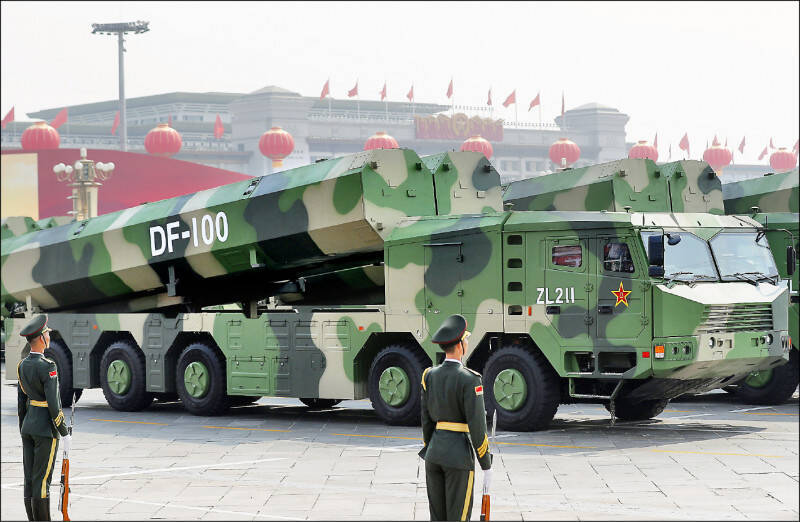Fei Xueli believes that the PLA may have 2,000 to 4,000 ballistic missiles and cruise missiles by 2027, using more than 1,25 H-6K/J/N bombers, each capable of carrying six cruise missiles, to attack Taiwan Indiscriminate bombing.
The picture shows China's so-called aircraft carrier killer supersonic anti-ship missile "Longjian-100" (DF-100).
(European News Agency)
[Reporter Wu Zheyu/Taipei Report] Recently, Richard D. Fisher, Jr., a senior researcher at the American think tank Center for International Assessment and Strategy, recently published an article calling on the United States to rebuild tactical nuclear weapons in Taiwan to deter Chinese invasion.
However, domestic scholars believe that the United States is unlikely to adopt it, and it is unlikely to be realized in practice.
Fei Xueli said that the U.S. deployed nuclear-capable Matador cruise missiles in Taiwan in the past to fulfill the "Sino-U.S. Mutual Defense Treaty" and successfully deter the CCP. The U.S. should do the same now.
Fei Xueli believes that although the United States has plans to deploy nuclear ballistic missiles in the Asia-Pacific, it will have to wait until 2025 to 2027 before deploying them in large numbers.
The U.S. should start an emergency contingency plan and deploy decommissioned low-yield tactical nuclear artillery shells in Taiwan. The range is only 14 to 100 kilometers. Taiwan Communist Army.
Please read on...
He also made other suggestions to Taiwan and the United States, such as using public television and radio to publicize war preparations and self-rescue work, adopting the ideas of Cao Xingcheng and Li Ximing, encouraging Japan to sell arms to Taiwan, inviting Taiwan to participate in multinational exercises, hiring retired Western civilian instructors, Lease unarmed weapons from military contractors and deploy them in Taiwan to allow the national army to train and familiarize themselves with operations, etc.
Shen Mingshi, director of the National Security Research Institute of the National Defense Academy, said that Fei Xueli's opinions have many levels, ranging from nuclear artillery shells to nuclear missiles, and these are just one of the "options" to provide the United States with a nuclear deterrent. The priority is not so high, and the United States is unlikely to deploy nuclear weapons at the beginning of a series of programs to aid Taiwan. In fact, the use of nuclear weapons is positioned as "passive retaliation" and "the ability to guarantee mutual destruction." Whether it is "tactical" or "strategic" nuclear weapons, as long as they are used, they will start a nuclear war, and the United States is unlikely to launch a pre-emptive strike.
Su Ziyun, director of the Strategy and Resources Research Institute of the National Defense Security Research Institute, also believes that the United States is unlikely to adopt this opinion, because the long-term policy of the United States is against deploying or assisting in the development of nuclear weapons in allies, and it is also against Japan and South Korea. Adopt the method of extending nuclear deterrence, that is, to ensure that when the allies are attacked by nuclear weapons, the United States will launch nuclear weapons to protect the allies, and the lowest level of "low-yield tactical nuclear shells" proposed by Fei Xueli is also unlikely in practice. Realized, because its traditional low-mobility launch method has gradually become unable to cope with modern warfare. On the contrary, the probability of being discovered and destroyed by the enemy is relatively high.
Su Ziyun said that Fei Xueli has long been known as an anti-communist, and his position has always been in favor of the United States deploying nuclear weapons in its allies, because it has been observed that countries such as Iran and North Korea can resist threats only by nuclear weapons, and the development of nuclear weapons in these countries is also affected by Russia. and China, both of which have now withdrawn from the INF Treaty that limits nuclear bombs, to think that the US should not be left behind.
Richard D. Fisher, Jr. recently published an article calling on the United States to rebuild tactical nuclear weapons in Taiwan to deter Chinese invasion.
(Picture taken from "Voice of America")
